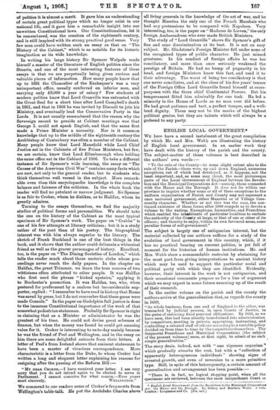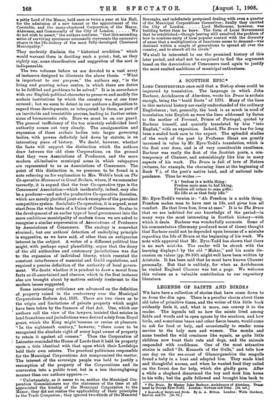ENGLISH LOCAL GOVERNMENT.* WE here have a second instalment of
the great compilation by which Mr. and Mrs. Webb are illustrating the history of English local government. In an earlier work they have dealt with the history of the parish and the county. The subject-matter of these volumes is best described in the authors' own words :-
" To the rule of the County—to some slight extent also to the rule of the Parish—there wore, up and down England, numerous exceptions, out of which had developed, as it happens, not the least important, and, as some may think, the most picturesque parts of the Local Government of England between the Revolu- tion and the Municipal Corporations Act—namely, those connected with the Manor and the Borough. It does not lie within our province to inquire whether some or all of these exceptions to the uniform organisation of Parish and County may not represent a once universal government, either Manorial or of Village Com- munity character. Whether or not this was the case, the con- tinued existence of these forms after 1689 compels us to devote a volume to the various Exemptions, Immunities, and Franchises which enabled the inhabitants of particular localities to exclude the authority of the County at large, or that of one or other of its officers ; and thereby to enjoy, within its own favoured areas, some peculiar forms of self-government."
The subject is largely one of antiquarian interest, but the material collected by our authors suffices for a study of the evolution of local government in this country, which, if it has no practical bearing on current politics, is yet full of moment for• the historian of human institutions. Mr. and Mrs. Webb show a commendable restraint by abstaining for the most part from giving interpretations to ancient history which may be used to support the particular social and political party with which they are identified. Evidently, however, their interest in the work is not antiquarian, and their occasional comments prepare us for• a line of argument which we may expect in some future summing up of the result
of their research.
In the earlier• volume on the parish and the county the authors arrive at the generalisation that, as regards the county in 1689,
"its whole business, from one end of England to the other, was transacted by judicial process, in open Courts of Justice, in the guise of enforcing fixed personal obligations. By 1835, as we have seen, this had been silently transformed into administration by committees, meeting in private, appointing, instructing, and controlling a salaried staff of officers according to a variable policy decided on from time to time by the committees themselves. The Seignorial Franchises and Municipal Corporations [the subject of the present volumes] seem, at first sight, to admit of no such simple generalisation."
The story deals, indeed, not with " one vigorous organism* which gradually absorbs the rest, but with a "collection of apparently heterogeneous individuals " showing signs of arrested growth, and even of reversion to a more primitive type. Still, in spite of this heterogeneity, a certain amount of generalisation and arrangement has been possible :— "There is, in fact, no logical stopping point, when all the specimens are reviewed, between the most insignificant Court oi • English Local Government from the Revolution to the Municipal Corporations Act: the Manor and the Borough. By Sidney and Beatrice Webb. 2 vole. London : Longman!' and Co. [25s. net.] a petty Lord of the Manor, held once or twice a year at his Hall, for the admission of a new tenant or the appointment of the Constable, and the many-chartered Corporation of the Mayor,
Aldermen, and Commonalty of the City of London We do not wish to assert," the authors continue, "that this ascending series of surviving specimens necessarily represents the successive stages in the life-history of the most fully-developed Chartered Municipality."
They modestly disclaim the " historical erudition" which would warrant them in deciding such a point ; but, as they rightly say, some classification and suggestion of the sort is indispensable.
The two volumes before us are devoted to a vast array of instances designed to illustrate the above thesis. " What is important to our purpose," the authors say, "is the living and growing urban centre, in which there are duties to be fulfilled and problems to be solved." It is in accordance with our English political character to preserve and modify the
archaic institutions by which the country was at one time covered ; but we seem to detect in our authors a disposition to regard these developments, as interpreted by them, as part of an inevitable and irresistible process, leading to further exten- sions of bureaucratic rule. Here we must be on our guard. The general inefficiency of the too minutely subdivided local authority comes out very clearly. The amalgamation and expansion of these archaic bodies into larger governing bodies, with powers definitely laid down by statute, is an interesting piece of history. We doubt, however, whether the facts will support the distinction which the authors draw between the old close Corporations, on the ground that they were Associations of Producers, and the more modern all-inclusive municipal areas in which ratepayers are represented to us as Associations of Consumers. The point of this distinction is, we presume, to be found in a note referring us for explanation to Mrs. Webb's book on The Co-operative :Movement in Great Britain, where, if we remember
correctly, it is argued that the true Co-operative type is the Consumers Association—which incidentally, indeed, may also be a producer—and not the productive Co-operative Societies, which are merely glorified joint-stock examples of the prevalent competitive system. Socialistic Co-operation, it is argued, must start from the wide basis of a Union of Consumers. So also in the development of an earlier type of local government into the more ambitious municipality of modern times we are asked to recognise a similar supersession of Associations of Producers by Associations of Consumers. The analogy is somewhat strained ; but our authors' detection of underlying principle is suggestive, as we have said, of other than an antiquarian interest in the subject. A writer of a different political bias might, with perhaps equal plausibility, argue that the decay of the old authorities and customary jurisdictions was due to the expansion of individual liberty, which resented the constant interference of manorial and Guild regulations, and required a precise definition of the authority of local govern- ment. We doubt whether it is prudent to draw a moral from facts so ill-ascertained and obscure, which in the first instance also are brought about by motives entirely irrelevant to the modern issues suggested.
Some interesting criticisms are advanced on the definition of property raised in the controversy over the Municipal Corporations Reform Act, 1835. There are two views as to the origin and limitations of private property which might have been taken by the framers of that Act. One, which our authors call the view of the lawyers, insisted that estates in land franchises and jurisdictions were derived solely from Royal grant, which the King might 'resume or revise at pleasure. " In the eighteenth century," however, " there came to be recognised the absolute right of every legal owner of property to retain it against all corners." Thus the Corporation of Leicester reminded the House of Lords that it held its property upon a title identical with that upon which their Lordships held their own estates. The practical politicians responsible for the Municipal Corporations Act compromised the matter. The interest of the sovereign people was held to justify a resumption of the property of the Corporations and its conversion into a public trust, but in a less thoroughgoing manner than our authors approve :- " Unfortunately, as it seems to us, neither the Municipal Cor- poration Commissioners nor the statesmen of the time at all appreciated the kinship of the Municipal Corporation to the Manor ; they did not realise the applicability of their principles to the Trade Companies ; they ignored two-thirds of the Manorial
Boroughs, and indefinitely postponed dealing with even a quarter of the Municipal Corporations themselves ; finally they omitted the City of London Lord Melbourne, however, was building better than be knew The form of Local Government
that he established—though leaving still unsolved the problem of how to combine unity of local popular control with the diversity of areas that a multiplication of functions seems to demand—was destined within a couple of generations to spread all over the country, and to absorb all its rivals."
We shall be interested to see the promised history of this later period, and shall not be surprised to find the argument based on the Association of Consumers used again to justify
the most exalted ambitions of municipal enthusiasm.



































 Previous page
Previous page